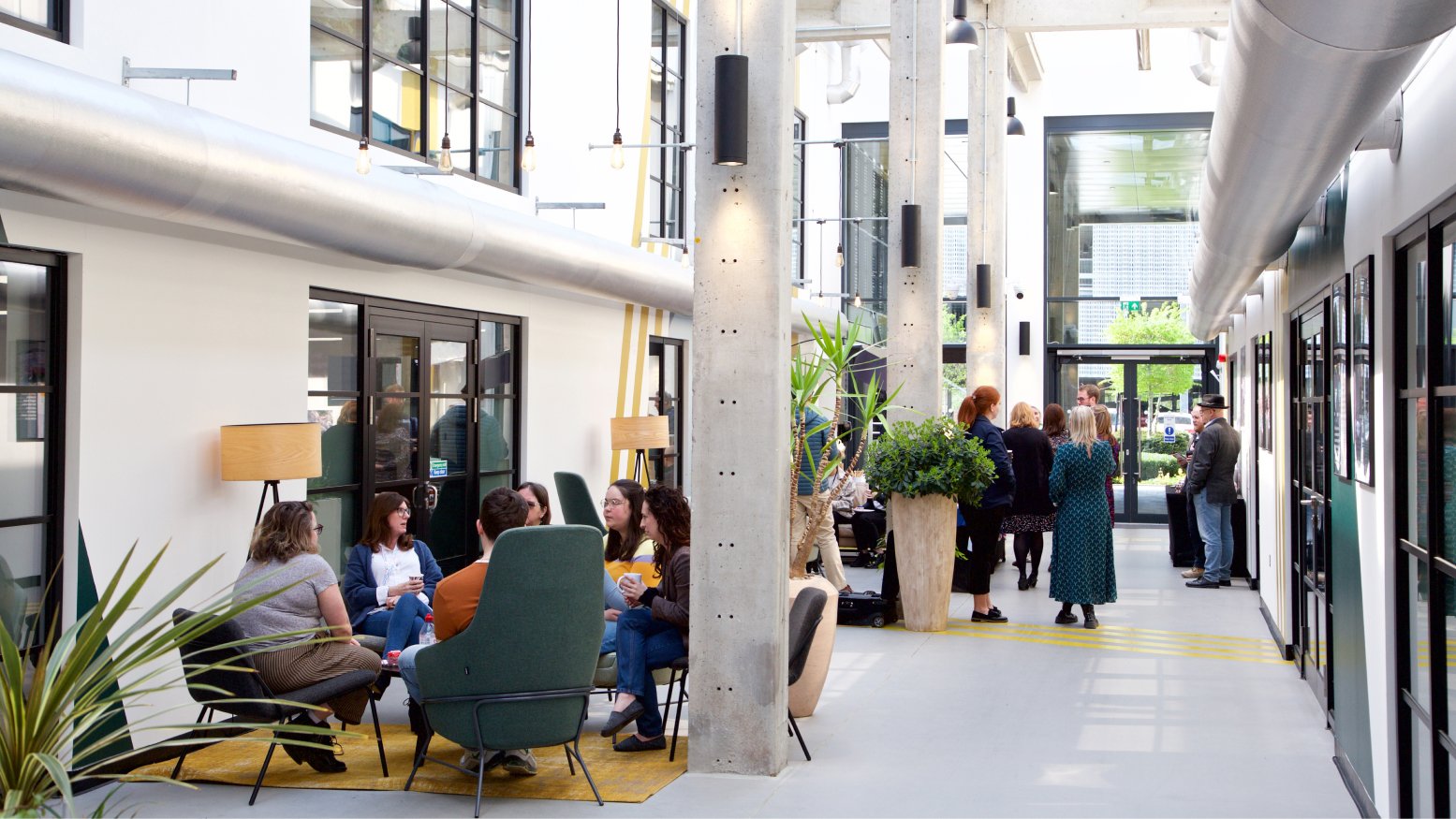News
Howard Group ‘tops out’ the first of its three new wet lab buildings at Unity Campus
Construction of Building A1, Unity Campus on track for completion in August 2023
Cambridge, 3rd April 2023: Leading regional property investor and developer Howard Group welcomed over 150 guests to witness the topping out of Building A1 at Unity Campus on Friday.
Following in the footsteps of a tradition believed to date back to pre-Dark Age Scandinavia, today topping out signifies that a structure has reached its maximum height. Howard Group celebrated this milestone in the construction of its Phase 2 buildings at Unity Campus by embedding a time capsule containing, amongst other items, a chamois leather – in recognition of the site’s heritage as a former tannery – into the concrete floor of the plant roof of Building A1.
Ahead of the ceremony, guests enjoyed breakfast on the ground floor of Building A1, which at 32,603 sq ft is the largest of the three wet lab buildings currently under construction. After a brief welcome and introduction by Nicholas Bewes, Howard Group’s CEO, a small topping out party made its way to the top floor to embed the time capsule, leaving the remaining guests to hear more about the past and present of the Campus from Unity Campus’ Interim Director, Jeanette Walker. Jamie Shearman, Area Director – Cambridge, Morgan Sindall, Howard Group’s appointed construction partner gave the audience an overview of the construction programme, specifically highlighting Morgan Sindall’s commitment to delivering intelligently designed, high quality buildings that are energy efficient, sustainable and will stand the test of time, before handing back to Nicholas to expand on the future vision for the Campus.
Nicholas Bewes, CEO, Howard Group said: “Unity Campus today is the product of over 10 years of work for Howard Group, having made our first purchase back in 2011 of the Sawston Trade Park. Since then, we have set about regenerating and renewing this site – including spending over £3M cleaning up what was a significantly contaminated area. This activity has been, and remains, a real team effort in partnership with many of those here today – our advisors, consultants, funders, member companies here at Unity Campus and those from the rich and vibrant local community that we are all so fortunate to be a part of. You all bring a great deal of expertise, commitment and collaborative enthusiasm for which we are most grateful.
“Howard Group’s centenary vision sets very high targets for both delivering positive environmental impact as well as social value and this project is a demonstration of our deep-rooted long-term focus as a family business to achieving these goals, as we strive to improve and enrich lives through responsible investing in people, places and ideas. In reality, here at Unity Campus that translates to supporting apprenticeships for young people who come from very challenging backgrounds – last month we recruited our fourth FutureIN apprentice – and over the summer we will welcome 18 work experience students from local schools. In addition, from an environmental perspective our whole approach to construction to reduce carbon footprint and waste has resulted in 99% of waste generated through the project being diverted from landfill.”
Directly addressing the urgent market demand for additional life science R&D space in the Cambridge area, Phase 2 is a pivotal next step in the delivery of Howard Group’s vision for Unity Campus. On track for completion in July (Building A2), August (Building A1) and November (Building B) this year, the three buildings are the next available newly constructed wet laboratory buildings in Cambridge, delivering a total of over 87,000 sq ft to the market. Interest is strong across all three buildings with Building A2 currently under offer. New occupiers will join an already burgeoning community of 12 leading life science and technology companies.

Mindful of both the environmental impact of the construction and ongoing management of the buildings across Unity Campus and its wider holdings, Howard Group is committed to driving its property portfolio to Net Zero Carbon by 2035. At Unity Campus this focus has resulted in the saving of 1300 tonnes of carbon through the re-imagining of The Works building in phase 1, and over 253 tonnes of up front carbon on phase 2 to date. These savings have been realised by making intelligent carbon choices at the design stage, which also serve to safeguard the performance of the lab buildings post construction – through innovations including the integration of intelligent building management systems and thermal performance criteria, which will deliver buildings that far exceed building regulations. The results of which will also directly benefit the future occupiers of these buildings in the form of savings on energy costs.
Jamie Shearman, Area Director – Cambridge, Morgan Sindall added: “The topping out ceremony is a great opportunity to reflect on the innovative nature of Building A1’s development and the close collaboration that we’ve enjoyed with Howard Group, which has been central to the project’s success. Completion of A1, together with buildings A2, B and the multi-storey car park extension will provide Howard Group and Unity Campus with market leading wet-laboratory spaces for world-class life science research and development businesses to use for many years to come.
“Throughout the design and construction process, we’ve leveraged our Intelligent Solutions approach to significantly cut carbon emissions. By using our CarboniCa tool and making conscious sustainability-focused choices, we have saved 253 tonnes of up front carbon since the project began.”
Unity Campus is a vibrant, exciting community of forward-thinking life science and tech companies attracted by the purposefully designed spaces which facilitate business interactions and friendships, encouraging innovation, collaboration and ideas exchange. By merging the traditional and modern, urban and rural, business and social, Unity Campus offers an entirely different working environment to other science and research parks in the Cambridge area, creating a wider choice of location for technology and life science companies seeking laboratories or offices.


 Previous article
Previous article